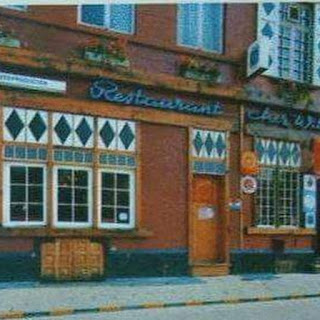 After
my studies in Ghent and with really only RadioVeronica
left for musical enjoyment, the reality of life set in. The idea of
gap years not having been hatched yet, employment had to be found
straight away, if not sooner. For the longest time I had been dreaming of working in
English language radio, but with Caroline
and even the smaller offshore stations
gone there was little chance of that wishful thinking ever coming
true. So I went hunting for more mundane jobs. Being a bit stubborn
however, I only applied to positions of employment where knowledge of
English would be an important factor.
After
my studies in Ghent and with really only RadioVeronica
left for musical enjoyment, the reality of life set in. The idea of
gap years not having been hatched yet, employment had to be found
straight away, if not sooner. For the longest time I had been dreaming of working in
English language radio, but with Caroline
and even the smaller offshore stations
gone there was little chance of that wishful thinking ever coming
true. So I went hunting for more mundane jobs. Being a bit stubborn
however, I only applied to positions of employment where knowledge of
English would be an important factor.
At
the Irish Embassy in Brussels they were most surprised to receive my
application since -although not specified in their ad- they “were
only looking for females”. In the late 60's 'emancipation'
apparently did not apply to men.
I had more luck when seeking a position at the Zeebrugge office of
Townsend
Car Ferries,
the company which had started a roll-on/roll-off service between
Dover and the Belgian port in 1966. Because traffic was increasing
steadily the company needed someone who could look after the Belgian
side of the accounts and explain things in proper English to the
Dover 'overlords'. I started work at Townsend Belgium on December
6th
1968.
 Just
before joining the working classes I had a “gap-10-days” in
Austria. (My only true vacation ever) In Ostend my friend and next door neighbour Walter and myself were joined by a busload of mostly
elderly English holiday makers for the trip to Seefeld. And yes in
the end we knew all the words to “She'll be coming round the
mountain”...
Just
before joining the working classes I had a “gap-10-days” in
Austria. (My only true vacation ever) In Ostend my friend and next door neighbour Walter and myself were joined by a busload of mostly
elderly English holiday makers for the trip to Seefeld. And yes in
the end we knew all the words to “She'll be coming round the
mountain”...
It
was whilst swimming at Die Kanne that we first heard Ö3
(Euh drei), the new third programme of Austrian radio, a pop music
station that sounded somewhat Caroline-ish (it still does to some
extent). As a result we spent quite a bit of time soaking up the hits
at the swimming pool.
Working
for Port Manager Noel
A. Johnston MBE (photo above) at Townsend Car Ferries in those early days was an absolute pleasure.
The office people busy in the small
cottage
near the old lock in Zeebrugge formed a tight-knit family, all trying
to get the ships loaded and out on time through the very narrow
Visart sluice gate. That was especially important since one of the
captains was said to consider just two speeds when negociating the
lock: “dead slow and stop”.
Only
weeks after I began my employment the highlight became the first
Christmas office party. It was held at the renowned “Chez Willy”
restaurant with succulent “râble de lièvre” (saddle of hare) on
the festive menu. In fact it was also my first time in a chic
restaurant. Little did I know that this classy eating house would
some time afterwards become one of my regular stomping grounds
entertaining visiting company dignitaries, nor that a year or so later, in early 1971, “Chez Willy” would
turn into a favourite dining place for Messrs
Meister and Bollier
of Radio
North Sea International.



